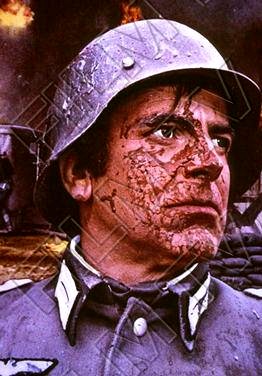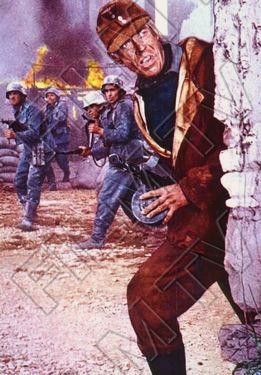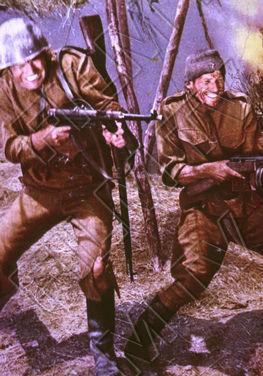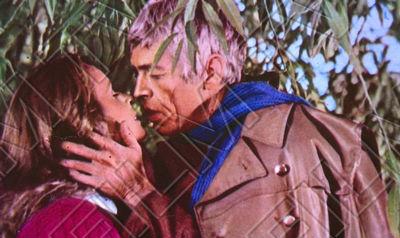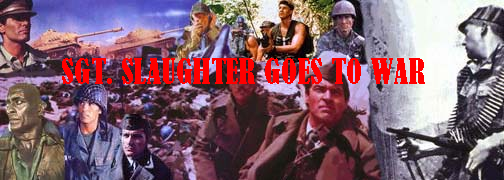
CROSS OF IRON (1977)
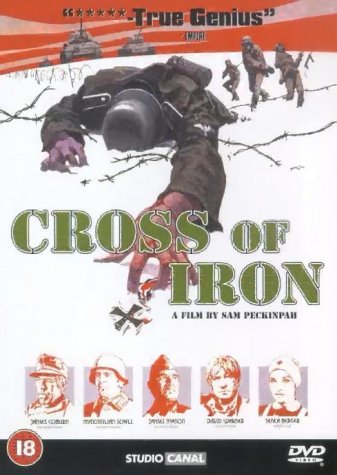
DIRECTOR:
Sam Peckinpah
CAST:
James Coburn, Maximilian Schell, James Mason, David Warner, Senta Berger, Klaus Lowitsch, Vadim Glowna and Arthur Brauss.
REVIEW:
In 1976, audiences witnessed John Sturges’ entertaining and appealing look at World War II from the German point of view in “The Eagle has Landed”. A year later, “Cross of Iron” was a released. Sam Peckinpah’s look at similar subject matter is a much more honest, downbeat and brutal tale. While “The Eagle has Landed” is a story of pure heroism, “Cross of Iron” is a depressing take on the horrors of war. This film proves that infantry soldiers are just men fighting for survival, no matter what uniform they wear.
In the spring of 1943, the German Army is on the retreat in Russia. They’re low on supplies, food and ammunition; the Reds are advancing in overwhelming numbers. Enter Prussian aristocrat Captain Stransky (Maximilian Schell) an ambitious and inexperienced officer who firmly believes in German patriotism and spirit. His superiors, Colonel Brandt (James Mason) and Captain Kiesel (David Warner) dismiss him as arrogant and disillusioned; gradually, the true source of his ignorance is revealed to be madness. In contrast is Sergeant Steiner (James Coburn), the hero of the piece. Steiner will prove that Stransky is an incompetent coward, and though Stransky comes to realize this, he refuses to admit it. The film follows a series of arguments and conversations regarding class difference, as the two men bait each other and grow to hate each other.
The conflict between Steiner and Stransky is a microcosm of the war around them. Every one of their encounters is either borne out of or cut off by vicious combat of some sort. How important is Stransky’s madness within the greater madness of a World War? From the moment Stransky appears, he is the villain. He’s freshly shaven and clad in a clean uniform, ordering dirty infantrymen to push his luggage-laden motorcycle out of a mud hole. His first meeting with Brandt and Kiesel defines his character: he jumps when artillery shells burst outside a cramped bunker, yet meticulously combs his gel-covered hair as he defies Brandt’s opinion that the war has already been lost. We’ve seen five minutes of film, and we’ve already chalked Stransky up as an arrogant idiot. Unlike typical characters, though, Stransky’s disillusionment grows throughout the piece, until a nail-biting climax involving a Russian assault on a rubble-strewn German rail yard, the outcome of which is never clearly determined.
Steiner and his men are the heroes of this film. They’re dirty, underfed and fighting for their own survival. Their only loyalty is to each other. The Fatherland and higher callings don’t matter – when Stransky has a member of an SS squad transferred to Steiner’s unit, the Sergeant promptly puts him in his place as a fellow infantryman. The difference between Nazis and ordinary men is drawn with bold, unmistakable strokes. Steiner’s hate for all officers never appears less than genuine. He considers them to be career soldiers whose only aim is to make war. Kiesel actually makes this point late in the film when Brandt asks him, “What we will do after the war?” to which Kiesel replies, “Prepare for the next one.” Perhaps Steiner’s view is unfair, but he sees Stransky as inept, and in the middle of a retreat, Brandt and Kiesel busy themselves with a formal investigation into Stransky’s conduct. Perhaps a little more than the stake of the officer corps’ reputation is at stake, eh? Something a bit more significant, like men’s lives? Steiner’s dedication to his brothers-in-arms shines through even when he is not in their presence. During an interlude at a hospital, he has a hallucination in which he pictures several of the patients as members of his squad. When one of them really does show up, he elects to return to combat instead of taking his awarded leave to the Fatherland. His commitment is to his men and only his men.
The effects of combat have rarely been portrayed so starkly. The first example comes when Kern (Vadim Glowna) explodes at his comrades during a birthday party, which immediately follows a deadly, violent patrol. Later, in a quieter moment, Kruger (Klaus Lowitsch) is the lone survivor of a Russian bombardment. Steiner finds him in total shell shock; he can’t move or let any emotion show through his voice. This scene is stark and moving. Battle sequences are brutal and intense. Peckinpah cuts rapidly from real-time to slow-motion very realistically. Many combat veterans say that time seems to slow down when you’re in the midst of a firefight; here, we see things as a soldier would. Sometimes, the handheld camera follows the men right into the trenches at a dizzying pace. At other moments, blood squibs and onrushing bodies are slowed incredibly.
Peckinpah’s film is ultimately a statement about the sheer madness that war is made up of. It’s not necessarily anti-war, but it is brutally honest and unflinching. One scene set in a Russian shack, in which Steiner’s squad captures several women prisoners, will become engraved in your memory due to its sheer graphic nature. Other lighter moments of soldiers’ humor revolving around farting, lack of bathing facilities and pure dirty nature of trench warfare are simultaneously hilarious and grim. This is easily one of the most engaging films about warfare ever shot. The North American DVD is to be avoided; I highly recommend the UK DVD which contains an uncut widescreen transfer.
SGT. SLAUGHTER'S RATING:
5 Bullets
